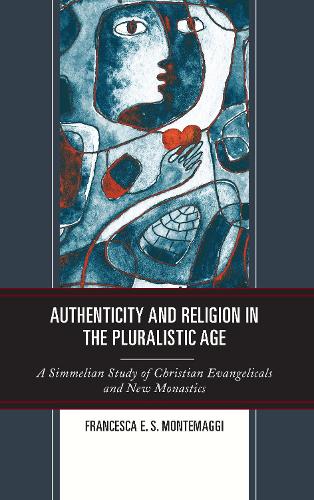
Authenticity and Religion in the Pluralistic Age: A Simmelian Study of Christian Evangelicals and New Monastics
(Hardback)
Publishing Details
Authenticity and Religion in the Pluralistic Age: A Simmelian Study of Christian Evangelicals and New Monastics
By (Author) Francesca E.S. Montemaggi
Bloomsbury Publishing PLC
Lexington Books
19th March 2019
United States
Classifications
Professional and Scholarly
Non Fiction
Philosophy of religion
Christianity
Social theory
305.67
Physical Properties
Hardback
236
Width 159mm, Height 232mm, Spine 23mm
540g
Description
This book provides an original concept of authenticity to illuminate the transformation of Christian consciousness in the increasingly more secular and pluralistic culture of Western societies. The present work is unique in offering an in-depth study of Simmels sociology and philosophy in dialogue with an ethnographic account of contemporary Christians. It develops original concepts drawing on Simmels writings on individuality and religion and connecting them with classical and contemporary scholarship in sociology and philosophy. The theoretical framework is illustrated through an analysis of the narratives and practices of Christians in an evangelical church in the UK and several New Monastic communities in the UK, US, and Canada. The book proposes an understanding of belief as relational and experiential and a concept of authenticity, as self-transcendence articulated in dialogue with religious tradition and the Other. Religious tradition is developed through an on-going process of interpretation and sacralization of what is considered within and without the traditions boundaries. The book also proposes an innovative approach to the study of morality by distinguishing between a people-centered ethic (ethic of compassion) and a norm-centered ethic (ethic of purity) to account for the the different ways in which Christians engage with the Other. This allows an exploration of the relationship between ethics and the making and breaking of boundaries in a given community. The case studies in this book show that committed Christians attempt to reconcile commitment to their tradition with the value of inclusiveness and to affirm their moral and religious identity as a distinctive moral lifestyle, not superior, but of equal worth to those of non-Christians.
Reviews
Headlines about the declining interest in religion in many western countries catch the eye but they also conceal evidence about the rise of new forms of Christianity. Francesca Montemaggis book is an invaluable guide to recent attempts to launch a dialogue between personal authenticity and Christian traditions, thereby reinventing Christianity for the twenty-first century. Adapting ideas from Georg Simmel, she paints a vivid picture of evangelicals and new monastics who cultivate spiritual and moral authenticity through their social relationships and communal activities. Their practices of serving, showing compassion, and offering hospitality take precedence over beliefs and doctrines. This is a work of theoretical imagination and descriptive richness which will appeal to all readers with a serious interest in religious change against a backdrop of growing diversity and pluralism. -- James A. Beckford, University of Warwick
Montemaggi's book offers a real innovation in the study of both contemporary Christianity and the seductive power of 'authenticity,' moving deftly between multi-site ethnography and a close reading of Simmel's sociological theory. -- James Bielo, Miami University
Author Bio
Francesca Montemaggi, PhD, is researcher in the fields of sociology and anthropology of morality and religion.
